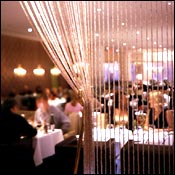
“What kind of food are we getting here, again? Indian?” asked my friend, the brasserie hound, as he glanced somewhat nervously around Django, the new, aggressively upmarket brasserie in midtown. Like many veterans of the great Manhattan brasserie mania of the past few decades, the brasserie hound was used to a certain comforting aesthetic sameness – low-key, neighborly location, waiters in white aprons, lots of mirrors and brass, etc. – when he consumed his oily frisée salads and bountiful platters of frites and moules. Django, however, is a different kind of brasserie. It’s a midtown destination restaurant on a grandiose scale, and while the proprietors (who also own Union Pacific and Rain) diligently follow the well-established brasserie menu in most respects (towering seafood plateaus, steak au poivre, onion soup, etc.), it’s difficult to know whether their ambitious establishment represents the apogee of this great dining trend or its unhappy end.
Let’s begin with the restaurant’s decidedly un-neighborly location, wedged into two floors on the back end of the Bear Stearns building. Restaurant-design guru David Rockwell has draped this cold corporate space with hand-blown chandeliers and long swags of gypsy carpet (Django is named for the great jazz guitarist Django Reinhart). The upstairs dining area is plastered with louche gold-and-purple wallpaper, and the bar area downstairs is filled with velvet banquettes plumped with tasseled satin pillows. Instead of the usual brass-and-mirrors brasserie motif, the walls and windows are hung with towering curtains of beads, and instead of a quaint alfresco café space, there’s a noisy dining terrace that affords a fine view of the taxicabs careering down Lexington Avenue.
The brasserie hound and I sat upstairs, where the extremely efficient Bear Stearns air-conditioning system reduced the room to penguin temperatures. The first thing out of the kitchen was a nice charcuterie platter decked with smoky pork rillettes and ribbons of fresh ham and prosciutto. Other standard brasserie items followed, like a mini serving of escargots, an underdressed frisée salad (the brasserie hound gave a thumbs-up to the croutons encrusted in Roquefort cheese), and a thick onion soup that tasted of overly sweetened bouillon cubes. The most elegant appetizer was the coquilles St. Jacques, which consisted of a single scallop on creamy whipped potatoes, dripped in bacon vinaigrette. The least elegant was the vichyssoise, which had the bland, somewhat gummy consistency (and color) of whipped avocados.
If this menu sounds stupefyingly familiar, that’s because it is. Django’s executive chef, Gwenael Le Pape, rarely deviates from the great brasserie canon, except to throw in a few fusion influences here and there. My mildly glutinous lobster bouillabaisse was decked with shiitake mushrooms, of all things, and a nicely crisped piece of red snapper was drowned in a heavy broth flavored with lemongrass and ginger. The best of these experimental dishes by far was the lemon-pepper shrimp, which are presented on skewers of sugarcane, over a delicious mash of chickpeas and tomatoes. Among traditionalist items, I preferred the nicely charred steak au poivre to the excessively charred hanger steak, and the rack of lamb (served with a delicious “gypsy cake” made with raisins, wild rice, hazelnuts, and cashews) to the two varieties of moules – one steamed in white wine, the other with merguez sausage and saffron – which were tepid both times I tried them.
Django was crowded on the evenings I was there, but the joint really rocks around lunchtime, when the tables are jammed with executive gourmets in their ash-colored suits. There’s a fine croque monsieur available then, a classically baked quiche, and a predictably delicious Django burger served on a crumbly brioche bun. The desserts mostly follow the aged brasserie pattern, with the exception of a $12 construction of sorbet that looks like a tottering gastronomic version of Carmen Miranda’s hat. This exotic, faintly ridiculous dish more than makes up for the dank profiteroles, served with what tasted like canned whipped cream. Traditionalists should stick to the crème brûlée; it’s well-cooked, if vaguely shopworn, which is as good a description as any for Django itself.
Django
•480 Lexington Avenue, at 46th Street (212-871-6600).
•Lunch, Monday through Friday noon to 2:30 p.m. Dinner, Monday through Friday 5 to 11 p.m., Saturday 6 to 11 p.m.
•Appetizers, $8 to $18; entrées, $17 to $29. All major credit cards.
